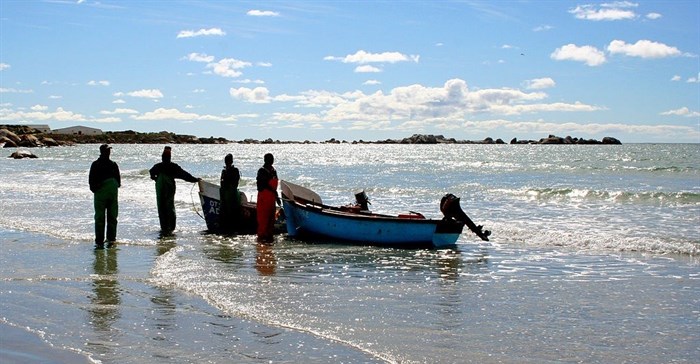A free smartphone app to help traditional fishers monitor their catches has burgeoned into a suite of products for use along the country's small-scale fisheries value chain.

Octagon via
Wikimedia Commons - Fishermen selling their catch of the day at the beach of Paternoster, Western Cape
Abalobi - named for the isiXhosa phrase abalobi bentlanzi meaning "fishers" - initially aimed to empower traditional fishers with data about their catches. The application has been produced by academics at the University of Cape Town, a unit in the Department of Agriculture, Forestry and Fisheries in conjunction with the fishers.
The importance of small-scale fisheries
Historically, the government refused to acknowledge the existence of the small-scale fisheries sector, with dire implications for about 30,000 traditional fishers along SA's bountiful coastline. Living marine resources are allocated through permits, but traditionally, only three groups were recognised: commercial, recreational and subsistence fishers.
Traditional or artisanal fishers straddle commercial and subsistence fishing: they make their living from marine resources, but are not big business. Because of this, they were not allocated fishing rights.
A 2007 Equality Court judgment found that both the apartheid-era and democratic governments had marginalised these fishers, and ordered the government to include them in its rights allocations. It has taken nine years for the government to begin rolling out its small-scale fisheries policy.
The importance of small-scale fisheries "cannot be overemphasised", says the UN Food and Agriculture Organisation. "While no definitive statistics exist, it is thought that the sector employs 50 million of the world's 51-million fishers - mostly from developing countries - producing nearly half of world fish production and supplying most of the fish consumed in the developing world," it says.
Catch-data monitoring
Abalobi will be the information management system for the small-scale fisheries industry, says Craig Smith, director of the small-scale fisheries management unit in the Department of Agriculture, Forestry and Fisheries. "Abalobi has been successfully piloted in five communities as a catch-data monitoring app," Smith says.
In addition, the unit used an extension of the app to verify the number of active traditional fishers. "The fishers have also given some useful input to make it even more attractive to their needs, which in turn has caused the popularity of the app to go up," he says.
With the data collected, fishers can prove that they make their living from the sea, says Nico Waldeck, a traditional fisher who recently joined the Abalobi project team.
Originally designed for desktop computers with R180,000 in seed funding from the Vodacom Foundation in 2014, researchers developed it into an open-source app. A National Research Foundation grant of about R100,000 supplemented this in 2015.
Multiple platforms
Dr Serge Raemaekers, a University of Cape Town academic who has been a crucial figure in driving the project, says that Abalobi Fisher, as the individual catch-management app has been renamed, will be just one of the Abalobi offerings.
Abalobi Fisher lets fishers log their catches. They can note what they caught, when, where, using what method and for how much they sold the fish. It spawned Abalobi Monitor, which is to be used by officials who monitor fishers' catches when they return to shore; Abalobi Analytics, which shows real-time catch data for captains or cooperative managers; Abalobi Co-operative, an accounting and analytics package for cooperatives; and Abalobi Marketplace, a platform for fishers and retailers.
The accounting and marketplace platforms are funded by the Technology Innovation Agency, a government agency tasked with bridging the gap between innovative ideas and marketable products. Restaurants and retailers can liaise with individual fishers or cooperatives on Abalobi Marketplace, Raemaekers says. This will "make it possible for them to have a direct relationship" and connect thousands of traditional fishers with markets, he says.
Proving the government wrong
Struisbaai fisher Hendrik Bantom wants to use his Abalobi Fisher data to show that the government's stock assessments are incorrect. The government has refused to allocate fishing rights for mullet on parts of the West Coast, saying that stocks of the 30cm silverfish are too low for fishing. "They are our life source in the long winter months when it is too dangerous to line-fish far out at sea," Bantom says.
He says that in his 15 years of fishing in Struisbaai, he has never seen a Department of Agriculture, Forestry and Fisheries scientist looking at mullet stocks. "We can now use the fish catch data on Abalobi phones to show the department that there is enough mullet here to feed the community on a sustainable basis," he says.
David Shoshola, a traditional fisher in Lamberts Bay, says scientists come once a year to do a stock assessment. He says they do not include information from traditional fishers' catches. "The government has no way of knowing what the catch per unit effort is of these fishers because they have very little data," Raemaekers says. "They have a little information from the monitors, but that's a small percentage of what's actually going on out there."
Improved data collection
Kim Prochazka, head of the government's fisheries resource research, says: "We are hopeful that Abalobi will not only provide data that can be used in stock assessments but that this will result in an improvement in current data collection models." However, this depends on the data being of sufficient quantity and quality, which will take time.
But a lynchpin in the Abalobi project is that fishers retain their own data. "What's critical is that the fishers own their data and then they decide who they want to share it with. It's sort of the development of a trust-building, relationship-building exercise," Raemaekers says.
Source: Business Day



































